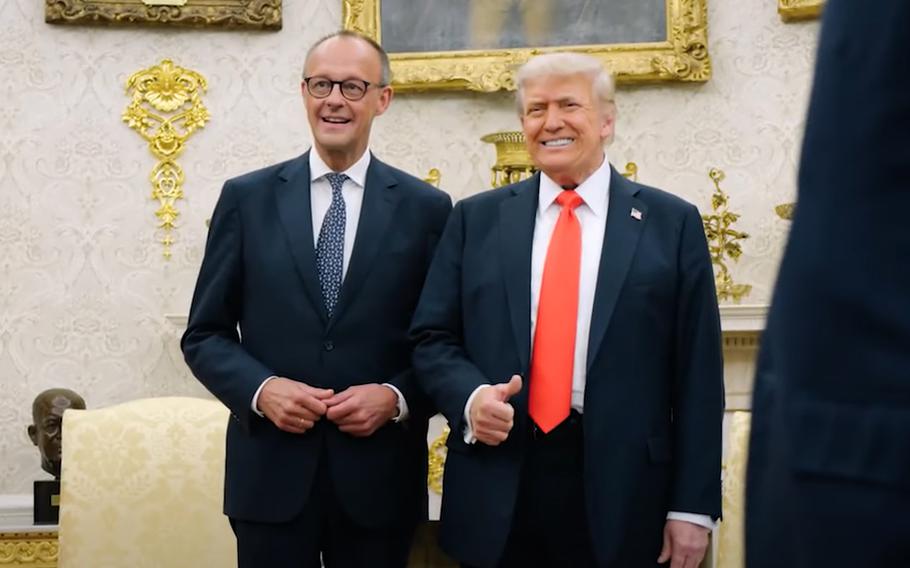
German Chancellor Friedrich Merz, left, poses with President Donald Trump in this still from a video taken during Merz's visit to the White House on June 5, 2025. During the visit, Trump said he wants to maintain the U.S. troop presence in Germany. (The White House)
Today’s nonstop 24/7 electronic media environment places a premium on mayhem, turmoil, and destructive and tragic events. In consequence, important positive developments are easily overlooked.
This is the ironic price of pervasive news media that are more decentralized and unregulated than in the 20th century, when network radio and television plus established prestige newspapers and national magazines dominated news dissemination.
As one current example, the extremely positive and productive — and calm — visit of Germany’s new Chancellor Friedrich Merz with President Donald Trump received relatively little media emphasis. This is especially unfortunate given the many challenges facing Europe and Atlantic area relations today, and the now-established important role of united Germany as a stabilizing force.
Merz, who is fluent in English, skillfully kept the conversation with Trump focused on areas of agreement. Perhaps the most important of these is the sustained emphasis by Trump, Vice President JD Vance and others on European nations doing more for their own defense.
Once passions related to personalities involved are removed from the discussion, their point of view clearly makes sense. With the Cold War now long over, nations in Europe, and for that matter elsewhere, should be seeking more self-sufficiency, not dependence.
The most effective and productive security alliances have been those among partners who recognize and develop shared interests, not dominance by one nation of others. The latter approach characterized the expansionist totalitarian dictatorships that dominated much of the 20th century, and so far in this century continue to fade.
Russia’s borders with nations of Europe are primarily a European responsibility. The United States should be involved and supportive, but dominating negotiations encourages Europeans to avoid difficult regional leadership and spend time on their preferred, relatively easy tasks of building Euro-bureaucracy and talking among themselves.
Today, while the Soviet Union is mercifully long gone, Russia’s Vladimir Putin is striving to re-create the borders of that failed state, notably in the 2022 invasion of Ukraine and ongoing brutal, costly war.
The Cold War was rooted in different conceptions of society and relations among nations. Soviet leaders “are not like … us,” wrote American diplomat George Kennan in his book “Realities of American Foreign Policy,” first published in 1954.
Kennan, expert on Germany and Russia, was among the most perceptive of American analysts of international relations, an always ardent student and writer. The containment policy he defined guided United States policies toward the Soviet Union throughout the Cold War, and has applicability today.
He focused on prudent realist diplomacy, which assumes conflict among national interests is inevitable. He emphasized Soviet and U.S. leaders vary markedly in experiences and fundamental worldview. The essentially unproductive communist system — if restrained — would eventually collapse.
In 1979, Princeton University Press published one of Kennan’s most challenging books, “The Decline of Bismarck’s European Order.” After unifying Germany, Otto von Bismarck provided effective diplomatic leadership to continental Europe through managing complex alliances. His removal from office, and the mediocre leadership that followed, facilitated World War I. That history applies today.
The European Union facilitates economic cooperation, and Germany is the natural regional leader. Chancellor Angela Merkel led Germany from 2005 to 2021, encouraging EU financial discipline.
Merz, from her Christian Democratic/Christian Social Union, and his predecessor Chancellor Olaf Scholz of the Social Democratic Party, follow her moderate path.
There is a natural temptation to avoid negative, indeed terrible, aspects of Europe’s history, but that provides useful context. Today, Russia is a military aggressor. However, Russia is paying a heavy price and Europe is united in opposition.
The far-right Alternative for Germany party is growing in support. Sensible U.S. leadership can help preserve Germany’s moderate path.
Arthur I. Cyr is the author of “After the Cold War.”